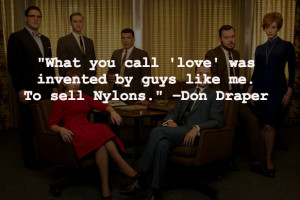Don’t laugh. I just started watching Mad Men this past week. Now that it’s over, I wanted to see what the fuss was about. I actually learned some things, namely that I really hope my grandfathers weren’t as misogynistic as all that, and that, if they were, that my grandmothers stood up for themselves a little better than some of the women in the show. But aside from the sociological lessons, the show is also a fantastic portrait of the ethical hinterland sometimes associated with the advertising and marketing industries.
In the first episode, Don Draper, brilliant creative director for a large ad agency in Manhattan, is trying to come up with a new ad idea for a tobacco company client on the heels of an article in Reader’s Digest that is telling consumers that smoking might actually be bad for them. He finally sells the tobacco executives on this tag line: “The other tobacco leaves are filled with poisons and pesticides. Ours are toasted.” The suits love it, and Don’s career is saved. What’s more—the ad works. Sales go up. After all, what do consumers know, except what they are told by advertisers?
Of course, ads that are aren’t legally misleading can be very persuasive based not on fact, but on what marketers want consumers to believe. Think about it: the whole point of the advertising industry is to convince people to buy something they probably otherwise wouldn’t. Don Draper wasn’t actually telling a lie…was he?
But with the advent of the digital information age, this scurrying around the facts is becoming harder to do and less acceptable to consumers. If a company is not outright lying, and not necessarily misleading, are they really making anyone’s life better in any substantial way, as most ads claim, and if not, are they making it worse? Perhaps and perhaps not, but shouldn’t consumers know exactly what they’re getting?
Consumers are researching, fact-finding, googling, asking questions, and in general, demanding to know what they’re being sold. According to a recent Forbes blog on current marketing integration trends, written by marketing expert and Forbes contributor Avi Dan, transparency is becoming a trend in the marketing and advertising industry simply because consumers are demanding it, and consumers have an increasing amount of say in the marketplace. Dan thinks that most brands are still unwilling to engage in what he calls “radical transparency,” but that it will become increasingly necessary to success (and profit) to ensure that consumers trust them. And, like it or not, digital media and brands are more closely entwined than ever; people can see you (Young, 2014).
Digital and social media shine a light in dark corners where no light has ever been before. Consumers can no longer be reached just via their emotions. They want you to satisfy them cognitively first, and if you don’t, they’ll find the answer elsewhere. What’s a company to do? Make a product about which you don’t have to lie, give consumers the facts (knowledge), then engage their emotions (convince). It may really be as simple (and as ethical) as giving consumers credit for being the smart, engaged targets they are, and letting the facts speak for themselves.
References
Dan, A. (2015). 11 marketing trends to watch for in 2015. Forbes. Retrieved from http://www.forbes.com/sites/avidan/2014/11/09/11-marketing-trends-to-watch-for-in-2015/.
HBO. (2007). “Smoke gets in your eyes.” Mad Men, Episode 1. DVD.
Young, A. (2014). Brand Media Strategy: Integrated Communications Planning in the Digital Era. Palgrave McMillan.


2 Responses to Knowledgeable consumers…what a concept!